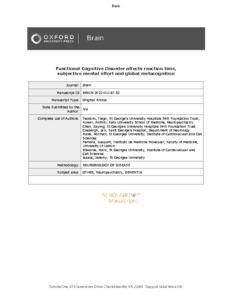Teodoro, T; Koreki, A; Chen, J; Coebergh, J; Poole, N; Ferreira, JJ; Edwards, MJ; Isaacs, JD
(2023)
Functional cognitive disorder affects reaction time, subjective mental effort and global metacognition.
Brain, 146 (4).
pp. 1615-1623.
ISSN 1460-2156
https://doi.org/10.1093/brain/awac363
SGUL Authors: Isaacs, Jeremy
![[img]](https://openaccess.sgul.ac.uk/116301/1.hassmallThumbnailVersion/BRAIN-2022-01197.R2_Proof_hi.pdf)  Preview |
|
PDF
Accepted Version
Available under License ["licenses_description_publisher" not defined].
Download (2MB)
| Preview
|
Abstract
We previously hypothesized that functional cognitive disorder is characterized by heightened subjective mental effort, exhausted attentional reserve and metacognitive failure. To test this hypothesis, we administered a Stroop colour-word task in which attentional demand was varied by task difficulty (congruent versus incongruent cues) and the presence of a secondary auditory stimulus (passive or active listening to an oddball-type paradigm). We measured subjective mental effort, objective performance (reaction times and accuracy), metacognition and EEG-based biomarkers of mental workload. We tested 19 functional cognitive disorder patients and 23 healthy controls. Patients reported higher levels of depression, anxiety, fatigue, pain, sleep disruption, dissociation and obsessiveness. They rated their memory as significantly poorer than healthy controls; however, accuracy did not differ between groups in any condition. In contrast to healthy controls, patients rated their performance as poorer on the congruent Stroop task with background noise compared to silent conditions. Functional cognitive disorder was consistently associated with slower reaction times but this was not exacerbated by increased attentional demand. Patients but not healthy controls reported greater mental workload in noisy conditions but EEG biomarkers were similar between groups, regardless of task difficulty. Functional cognitive disorder has significant syndromic overlap with mood disorders and chronic fatigue and pain. It is associated with global metacognitive failure whereas local (task-specific) metacognition is only selectively impaired. Patients were slower than healthy controls, which might contribute to the 'brain fog' reported in this condition. Although subjective mental effort was increased in noisy conditions, we found no evidence of attentional exhaustion in functional cognitive disorder. Our results indicate that functional cognitive disorder is a multisystem condition affecting reaction time, subjective mental effort and global metacognition.
| Item Type: |
Article
|
| Additional Information: |
This is a pre-copyedited, author-produced version of an article accepted for publication in Brain following peer review. The version of record Tiago Teodoro, Akihiro Koreki, Jiaying Chen, Jan Coebergh, Norman Poole, Joaquim J Ferreira, Mark J Edwards, Jeremy D Isaacs, Functional cognitive disorder affects reaction time, subjective mental effort and global metacognition, Brain, Volume 146, Issue 4, April 2023, Pages 1615–1623 is available online at: https://doi.org/10.1093/brain/awac363 |
| Keywords: |
functional cognitive disorder, functional neurological disorder, Humans, Reaction Time, Metacognition, Cognitive Dysfunction, Cognition Disorders, Biomarkers, Humans, Reaction Time, Cognition Disorders, Biomarkers, Metacognition, Cognitive Dysfunction, functional cognitive disorder, functional neurological disorder, Biomarkers, Cognition Disorders, Cognitive Dysfunction, Humans, Metacognition, Reaction Time, functional cognitive disorder, functional neurological disorder, 11 Medical and Health Sciences, 17 Psychology and Cognitive Sciences, Neurology & Neurosurgery |
| Journal or Publication Title: |
Brain |
| ISSN: |
1460-2156 |
| Language: |
eng |
| Dates: |
| Date | Event |
|---|
| 19 April 2023 | Published | | 6 October 2022 | Published Online | | 8 September 2022 | Accepted |
|
| PubMed ID: |
36200349 |
| Web of Science ID: |
WOS:000909383700001 |
 |
Go to PubMed abstract |
| URI: |
https://openaccess.sgul.ac.uk/id/eprint/116301 |
| Publisher's version: |
https://doi.org/10.1093/brain/awac363 |
Statistics
Item downloaded times since 14 Mar 2024.
Actions (login required)
 |
Edit Item |



